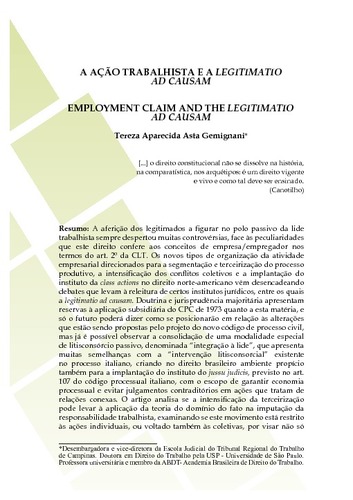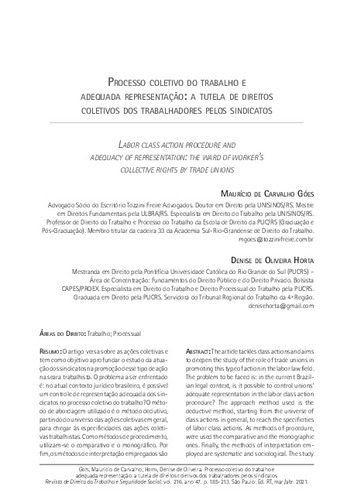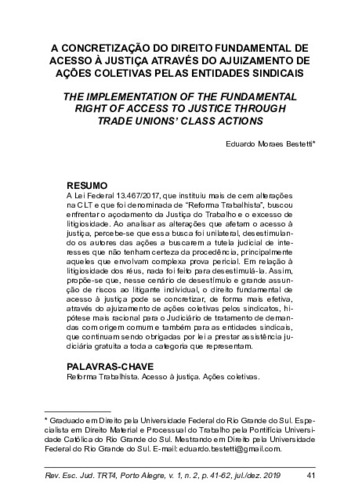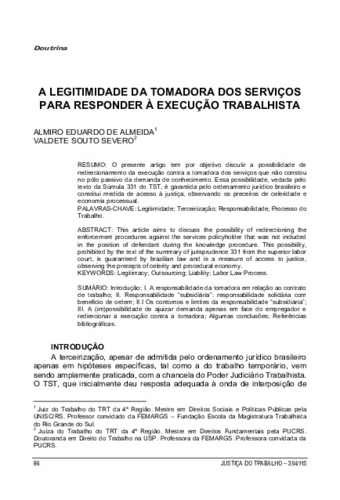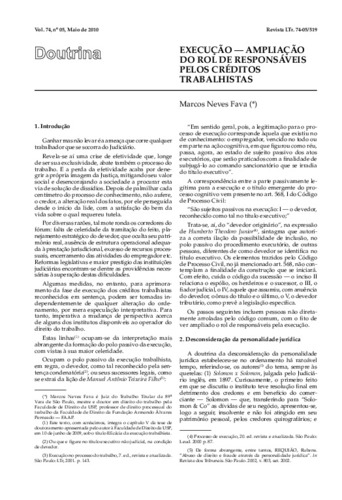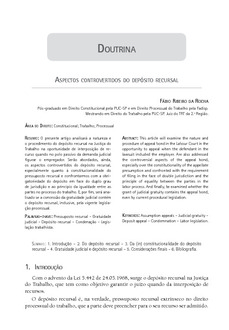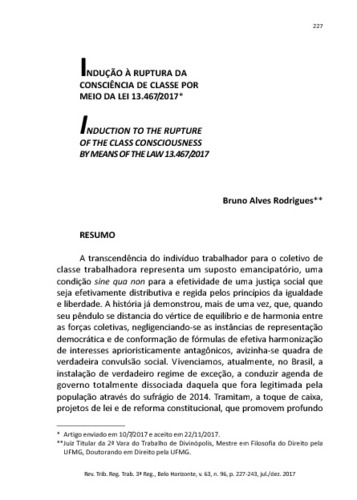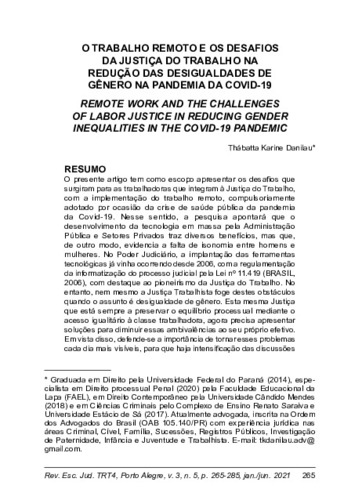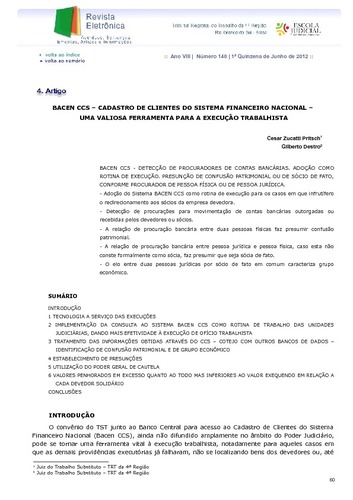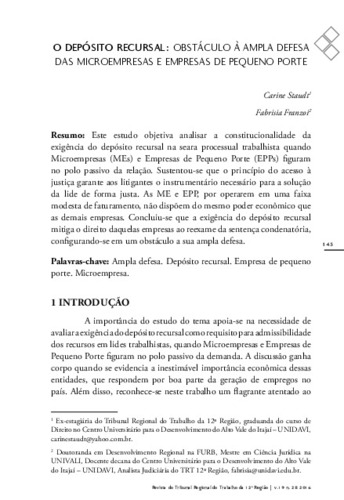Artigo de periódico
A ação trabalhista e a legitimatio ad causam
| dc.contributor.author | Gemignani, Tereza Aparecida Asta | |
| dc.date.accessioned | 2017-04-27T16:06:47Z | |
| dc.date.available | 2017-04-27T16:06:47Z | |
| dc.date.issued | 2014-12 | |
| dc.identifier.citation | GEMIGNANI, Tereza Aparecida Asta. A ação trabalhista e a legitimatio ad causam = Employment claim and the legitimatio ad causam. Revista do Tribunal Regional do Trabalho da 15ª Região, Campinas, n. 45, p. 145-159, jul./dez. 2014. | pt_BR |
| dc.identifier.uri | https://hdl.handle.net/20.500.12178/103580 | |
| dc.description.abstract | [por] A aferição dos legitimados a figurar no polo passivo da lide trabalhista sempre despertou muitas controvérsias, face às peculiaridades que este direito confere aos conceitos de empresa/empregador nos termos do art. 2º da CLT. Os novos tipos de organização da atividade empresarial direcionados para a segmentação e terceirização do processo produtivo, a intensificação dos conflitos coletivos e a implantação do instituto da class actions no direito norte-americano vêm desencadeando debates que levam à releitura de certos institutos jurídicos, entre os quais a legitimatio ad causam. Doutrina e jurisprudência majoritária apresentam reservas à aplicação subsidiária do CPC de 1973 quanto a esta matéria, e só o futuro poderá dizer como se posicionarão em relação às alterações que estão sendo propostas pelo projeto do novo código de processo civil, mas já é possível observar a consolidação de uma modalidade especial de litisconsórcio passivo, denominada "integração à lide", que apresenta muitas semelhanças com a "intervenção litisconsorcial" existente no processo italiano, criando no direito brasileiro ambiente propício também para a implantação do instituto do jussu judicis, previsto no art. 107 do código processual italiano, com o escopo de garantir economia processual e evitar julgamentos contraditórios em ações que tratam de relações conexas. O artigo analisa se a intensificação da terceirização pode levar à aplicação da teoria do domínio do fato na imputação da responsabilidade trabalhista, examinando se este movimento está restrito às ações individuais, ou voltado também às coletivas, por visar não só a celeridade, eficiência e utilidade da jurisdição, mas principalmente garantir a ampliação do acesso às tutelas reparatórias e inibitórias, direitos que a Carta Republicana de 1988 elevou à condição de fundamentais. | pt_BR |
| dc.description.abstract | [eng] The guaging of the legitimated persons appearing on the party defendant's labor prosecution has always aroused much controversy, in the face of the peculiarities that this right gives to the concepts of company/employer pursuant to art. 2º of CLT. The new types of business activity organization directed to the segmentation and outsourcing of the production process, the intensification of collective conflict and the deployment of the institute of class actions in American law come triggering debates that lead to the reinterpretation of certain legal institutions, among which the legitimatio ad causam. Doctrine and majority jurisprudence have reserves to the subsidiary application of CPC 1973 on this matter, and only the future will tell how they will position themselves in relation to the changes that have being proposed by the new code of civil procedure project, but it is already possible to observe the consolidation of a special type of defendant joint, called "integration to the action", which has many similarities with the joint intervention existing in the Italian action, creating enabling environment in Brazilian law for the implementation of the Institute of jussu judicis, provided by the article 107 of the Italian procedural code, with the aim of ensuring judicial economy and avoid contradictory judgments in actions dealing with connected relations. The article analyzes if the intensification of outsourcing may lead to the application of the theory of domain of the fact in the imputation of labor responsibility, examining whether this movement is restricted to individual actions, or also referent to the collective ones, by targeting not only the speed, efficiency and usefulness of the jurisdiction, but primarily to ensure the expansion of the access to reparation and inhibitory guardianship, rights that the Republican Constitution of 1988 raised to the condition of fundamental ones. | pt_BR |
| dc.description.tableofcontents | A evolução do instituto -- O novo conceito de acesso à justiça -- Legitimatio ad causam do polo passivo e as peculiaridades do processo trabalhista | pt_BR |
| dc.language.iso | pt_BR | pt_BR |
| dc.relation.ispartof | Revista do Tribunal Regional do Trabalho da 15ª Região: n. 45 (jul./dez. 2014) | pt_BR |
| dc.subject | Legitimatio ad causam, Brasil | pt_BR |
| dc.subject | Litisconsórcio, Brasil | pt_BR |
| dc.subject | Empregador, Brasil | pt_BR |
| dc.subject | Ação coletiva, Brasil | pt_BR |
| dc.subject | Processo trabalhista, Brasil | pt_BR |
| dc.subject | Acesso à justiça, Brasil | pt_BR |
| dc.title | A ação trabalhista e a legitimatio ad causam | pt_BR |
| dc.title.alternative | Employment claim and the legitimatio ad causam | pt_BR |
| dc.type.genre | Artigo de periódico | pt_BR |
| dc.identifier.rvbisys | 001025658 | |
| dc.relation.ispartoflink | https://hdl.handle.net/20.500.12178/91943 | pt_BR |
Ce document figure dans la(les) collection(s) suivante(s)
-
Artigos9527


